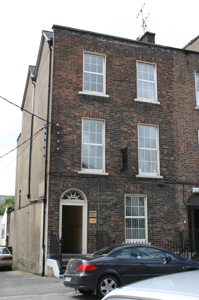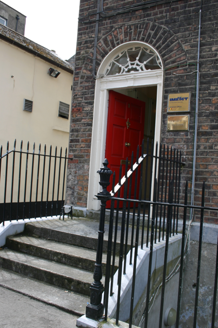Survey Data
Reg No
21517127
Rating
Regional
Categories of Special Interest
Architectural, Artistic
Original Use
House
In Use As
Office
Date
1840 - 1860
Coordinates
157229, 156515
Date Recorded
16/07/2005
Date Updated
--/--/--
Description
End-of-terrace two-bay three-storey over basement red brick house, built c. 1850, with a two-storey over basement return to rear. Pitched M-profile artificial slate roof concealed to front behind parapet wall, and exposed to side elevation, with rendered and red brick chimneystack to west party wall. Red brick front elevation laid in Flemish bond with cement mortar re-pointing; lead damp proof course beneath parapet coping; rendered basement elevation and limestone plinth course delineating ground floor level; rendered rear and return elevations. Square-headed window openings, red brick flat arches, patent rendered reveals, painted limestone sills; replacement uPVC windows. Segmental-arch door opening, with red brick arch, patent rendered reveals, and plain inset timber doorcase comprising flat-panelled uprights joined by profiled lintel with keystone and shallow end breaks; original webbed lead detailed fanlight above; raised and fielded panelled timber door. Concrete covered front door platform with wrought-iron bootscraper, bridges basement area, flanked by reproduction railings, which returns to enclose the front site basement area accessed by concrete steps, c. 1980. Rear site enclosed by single-storey outbuilding, c. 1980.
Appraisal
Forming one of a terrace of six houses, which are of a modest scale when compared with the O'Connell Street (formerly George's Street) terraces. Newenham Street is named after Rev. Edward Newenham Hoare, who built the Trinity Church of Ireland Church.







